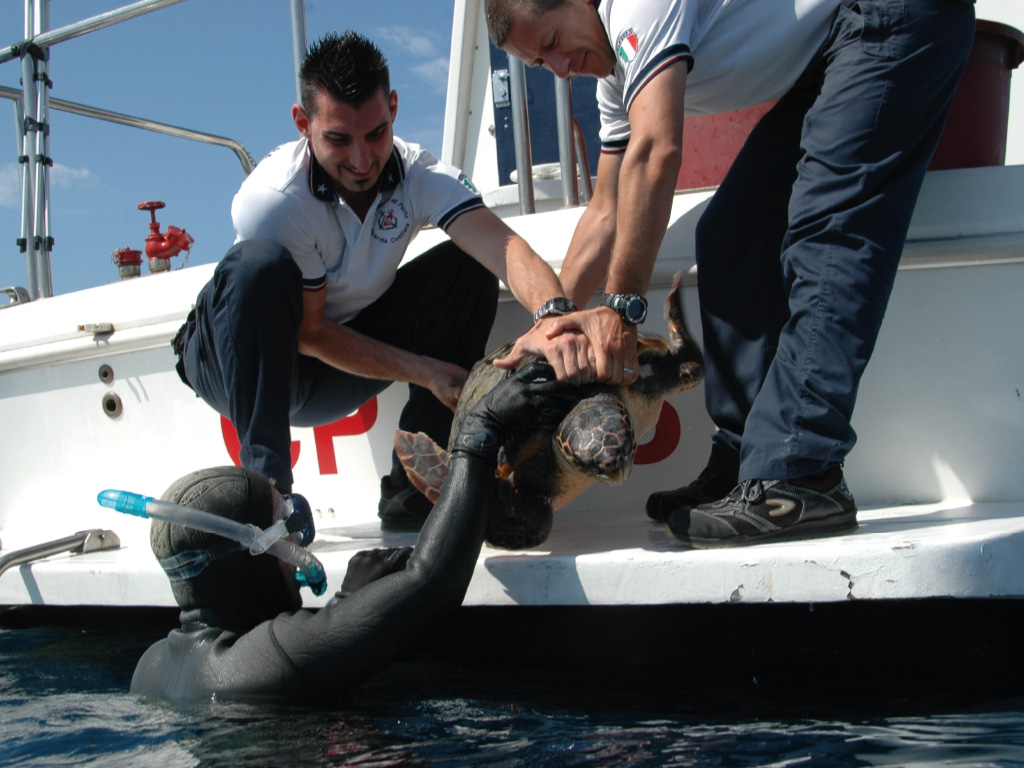160 anni e non dimostrarli. Sì perché le Capitanerie di Porto sono un Corpo della Marina Militare giovane, dinamico, al passo con i tempi. Le divise non incutono timore ma rassicurano coloro che hanno bisogno del loro intervento o dei loro consigli, soprattutto in mare, quando le certezze possono andare in crisi di fronte a un imprevisto o a una libecciata. Sempre al servizio dei naviganti, giorno e notte, per la salvaguardia della vita in mare, le Capitanerie svolgono un’importante funzione sia nella tutela ambientale che per quanto attiene la pesca e l’acquacoltura, come per le altre attività antropiche che hanno a che vedere con le coste e l’elemento mare. Sempre attenti a far rispettare le regole, il loro ruolo è fondamentale anche a terra, soprattutto per la tutela della salute dei cittadini. “Bisogna partire dai più piccoli – conclude il Comandante Floriana Segreto, Comandante del Compartimento marittimo di Portoferraio – per fare capire che il mare non è un elemento inesauribile come potrebbe sembrare a prima vista data la preminenza di acqua nel nostro globo. Il mare nasconde nei suoi abissi, ma purtroppo l’inquinamento mette in crisi la vita sul pianeta e quando ce ne accorgiamo è già troppo tardi. È nostro dovere consegnare ai nostri figli un mondo pulito, giusto, che abbiamo ricevuto solo in prestito. Il futuro è tutto loro”.
160 years and not showing it. Yes, the Harbour Masters are a young, dynamic Navy corps. Instead of instilling fear, their uniforms reassure those who need their intervention or their advice, especially at sea, where certainty can break down in the face of an unforeseen event or a Libeccio gale. They are always at the service of seafarers, day and night, to safeguard life at sea. The Harbour Masters play an important role both in protecting the environment and in all human activities that are related to the coasts and the element of the sea. They are always careful to enforce the rules and their role is fundamental on land too, especially for the protection of citizens’ health. “We have to start by divulging the culture of the sea,” says C.F. Floriana Segreto, Commander of the Portoferraio Maritime Compartment, “because it is a resource of an enormous recreational and economic value. But however wonderful, it is a fragile element. Any human activity has an impact on the marine ecosystem, from navigation to the construction of marinas or commercial ports, from the use of beaches for bathing to the master plans of maritime cities, from the control of commercial activities to recreational and sporting initiatives. In a country like Italy, with its 8,300 km of coastline, which bases a huge part of its economy on the sea, the Coast Guard has tasks of protection, guidance, regulation, proposal, support and problem solving. In our daily commitment, sanctioning does not prevail. For us, it is essential to transmit love and respect for the “sea resource” by establishing a relationship of trust with the communities concerned and their cultural identity. We are also very attentive to everything that happens in the third sector to support the most fragile people. As for all who go to sea,” argued C.F. Segreto, “teamwork is crucial, and the team in addition to the Coast Guard personnel also consists of sea users who love the sea as much as we do. Only together can we win the challenge of the future for sustainable development, both from an environmental and social point of view.” The Coast Guard addresses young people throughout Italy, as on the Day of the Sea and Maritime Culture when, in agreement with the Ministry of Education, the culture of the sea is promoted in schools at all levels. “We have to start with the youngest,” the Commander concludes, “to make them understand that the sea is not an inexhaustible element as it might seem at first sight due to the predominance of water on our globe. The sea hides in its depths but unfortunately pollution puts life on our planet in peril and when we realise this, it is already too late. It is our duty to hand over to our children the clean, just world that we have only borrowed. The future is all theirs.”
Die Küstenwache ist ein Teil der italienischen Marine und wurde vor 160 Jahren gegründet. Heute präsentiert sie sich als moderne, dynamische Organisation, die sowohl die Akteure der maritimen Wirtschaft als auch Freizeitskipper unterstützt. Neben der Gewährleistung der Sicherheit auf See gehören der Umweltschutz, die Überwachung der Fischerei sowie die Kontrolle der Verwendung von Meeresprodukten für den menschlichen Verzehr zu ihren Aufgaben. Darüber hinaus überwacht die Küstenwache die ordnungsgemäße Nutzung maritimer Infrastrukturen im Hinblick auf touristische Aktivitäten. „Wir müssen bereits in Schulen die Bedeutung des Meeres vermitteln“, erklärt Fregattenkapitänin Floriana Segreto, Kommandantin der Hafenbehörde von Portoferraio. „Das Meer stellt eine Ressource von erheblichem kulturellem, wissenschaftlichem und wirtschaftlichem Wert dar, zugleich aber auch ein ökologisch sensibles System, das besonderer Aufmerksamkeit bedarf. Italien verfügt über 8.300 Kilometer Küste – ein bedeutendes Naturerbe, das es zu schützen gilt. Für die Hafenbehörden ist der Dialog mit der Bevölkerung von zentraler Bedeutung, denn nachhaltige Entwicklung bedeutet auch soziales Engagement. Unser Ziel ist es, gemeinsam mit den Bürgerinnen und Bürgern Verantwortung zu übernehmen und künftigen Generationen eine saubere Umwelt und gesunde Meere zu hinterlassen.“

